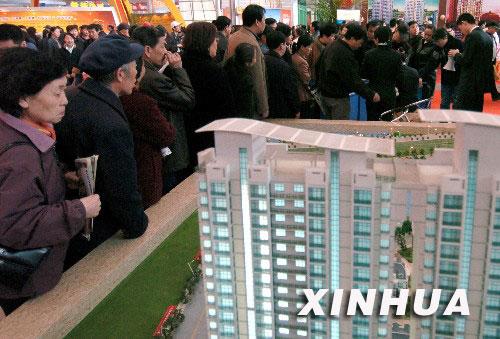Property prices in top cities remain flat
 0 Comment(s)
0 Comment(s) Print
Print E-mail
China Daily, August 19, 2011
E-mail
China Daily, August 19, 2011
 |
|
New home prices in three first-tier cities, Beijing, Shanghai and Shenzhen, were the same in July as they were in June, the National Bureau of Statistics (NBS) said on Thursday. |
Property prices in three first-tier cities - Beijing, Shanghai and Shenzhen - were flat on a monthly basis in July, the first time this has happened in three years, as rigorous tightening policies started to bite.
New home prices in the three cities were the same in July as they were in June, the National Bureau of Statistics (NBS) said on Thursday.
"The figures clearly point to a falling trend in property prices," Zhang Dawei, chief researcher with Centaline Group, a Hong Kong-based real estate agency, said.
But price growth was static only in the big cities and a national turning point "has yet to emerge", he said.
In July, 31 cities recorded lower or flat property prices, five more than in June.
Of the 70 major sample cities, property prices fell in 14, and were unchanged in 17, when measured against June's figures, according to the NBS.
In June, there were 26 cities where property prices either fell or remained unchanged when measured against the previous month.
On a yearly basis, only one city of the 70 monitored, Sanya, in the island province of Hainan, saw a price drop, but the rate of price growth slowed in 26 cities.
"As the tightening measures continue and restrictions on home purchases expand to more small cities, property sales and prices are expected to continue to drop in the coming months," said Qin Xiaomei, chief researcher at international real estate service provider, Jones Lang LaSalle.
Chen Sheng, vice-president of the China Index Academy, said both developers and buyers had adopted a wait-and-see attitude in the past two months, but it is clear that government curbs will continue and may become even tougher.
In its latest effort to cool property prices, the government has begun preparing purchase restrictions in second- and third-tier cities. This is to tackle price surges as developers turn their attention away from first-tier cities.
The Ministry of Housing and Urban-Rural Development on Wednesday announced the criteria that could lead to restrictions. They included a surge in prices or transaction volumes in the first half of the year, Xinhua reported.
The Shanghai Securities News reported on Wednesday that the authorities had ordered provincial governments to report progress in curbing prices and to prepare a list of cities where home-purchasing restrictions will be imposed.
"But a big fall in prices is unlikely, as demand remains strong," Qin said.
According to a report by Ping An Insurance, around 22 percent of high-income families plan to purchase homes in the near future. But 51.9 percent of medium-income families will wait and see how the market moves.
Despite tightening policies, the prices of quality homes and commercial projects in prime locations remain stable, Qin said.
But with strict real estate policies continuing and financing channels tightened in the second half of the year, the real estate industry will be further consolidated, analysts said.
According to statistics by Leju and Centaline Group, there were 62 deals involving mergers and acquisitions in the first seven months of this year, totaling 17.5 billion yuan. That represents an increase of 72.2 percent in the number of such deals and 101.9 percent in the amount of money involved compared with the same period last year.
"We expect more mergers and acquisitions in the property industry in the coming months," Wu Tao, managing director of Wins Investment Management, said.





